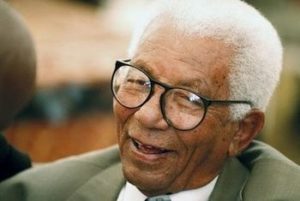
Walter Sisulu
*Walter Sisulu was born on this date in 1912. He was a Black African politician and activist.
Walter Max Ulyate Sisulu was from the village of Qutubeni in the Engcobo district of Transkei, South Africa. His mother was a Black domestic worker, and his father was a white public servant. Never formally recognized by his father, Sisulu, AKA Xhamela (his tribal name), was raised in the tribal tradition by his mother's family and experienced Xhosa initiation rites. He received his primary education at the village school and a nearby Anglican mission.
In 1928, he moved to Johannesburg to work various jobs, including dairy worker, laborer, miner, domestic, baker, factory jobs, part-time teller, and advertising agent. Sisulu studied at night school, going into business for himself as a small real estate agent. In the early 1930s, he brought his mother and sister to live with him. Over this period, Sisulu became involved in political activities, organizing strikes through the “Orlando Brotherly Society.” In 1940, he joined the African National Congress (ANC).
During this time, he met Nelson Mandela, who referred him for employment with a lawyer in Johannesburg. The work and loans from Sisulu enabled Mandela to complete his law degree at the University of South Africa. The two became friends. In 1944, with Mandela and Oliver Tambo, he founded the ANC Youth League and was the league's treasurer.
He married Albertina Titowe, a nurse and prominent anti-apartheid activist. The couple had five children; four spent time in exile or prison. Black life in South Africa took another turn for the worse in 1948. The white electorate voted the National Party into power that year. They campaigned on the promise to introduce a system of "apartheid" to separate the races. Discrimination against Blacks, "coloured," and Asians was codified and extended. All South Africans were legally assigned to one racial group: white, African, colored, or Asian. All races had separate living areas and amenities (such as toilets, parks, and beaches).
Signs enforcing the separation are erected throughout the country. Only white South Africans are allowed full political rights. At this time, Sisulu and Tambo were elected to the ANC national executive. In 1949, the ANC adopted the Youth League's 'Program of Action' at its annual conference. They advocated using boycotts, strikes, civil disobedience, and non-cooperation to achieve full citizenship and direct parliamentary representation for all South Africans. Sisulu was elected secretary-general of the ANC. He closed his estate agency business and became a full-time party organizer. In 1952, the government introduced harsher penalties for protests against apartheid. Campaign leaders and newspapers were banned, and about 8,500 people were arrested, including Sisulu.
He was designated a statutory "communist" and sentenced to three years' imprisonment. Before the sentencing, he tells the court, "I wish to make this solemn vow, and in full appreciation of the consequences it entails. As long as I enjoy the confidence of my people, and as long as there is a spark of life and energy in me, I shall fight with courage and determination for the abolition of discriminatory laws and the freedom of all South Africans, irrespective of color or creed." In 1956, Sisulu, Mandela, Tambo, and 153 others were arrested for high treason and charges under the Suppression of Communism Act. They were acquitted on all counts in 1961.
During this time, the regime introduced a program of the forced relocation of Africans, colored, and Asians from areas designated for Whites only to the homelands and other declared areas. In July 1963, police raided an ANC safe house in Rivonia and discovered arms and equipment. Sisulu, Mandela, and other leaders of the ANC and Umkhonto stand trial for plotting to overthrow the government by violence and bring about a communist state. On June 11, 1964, eight accused, including Sisulu and Mandela, were convicted. All are sentenced to life imprisonment at Robben Island Prison.
In 1982, Sisulu was transferred to the maximum-security Pollsmoor Prison on the mainland. On October 15, 1989, Sisulu was released from prison with five other senior members of the ANC. He was awarded 'Isithwalandwe Seaparankoe,' the ANC's highest honor 1992. In 1994, Sisulu left active duty in the ANC and retired to his family home in Soweto. Two years later, Sisulu helped the new South African constitution bar discrimination against minorities, including whites.
In 1999, he found great satisfaction when the ANC won the general election, increasing its majority. Walter Sisulu died on May 5, 2003, at his home after a long illness. His state funeral was held 12 days later.